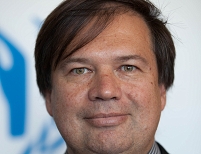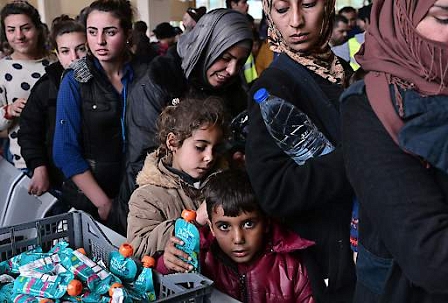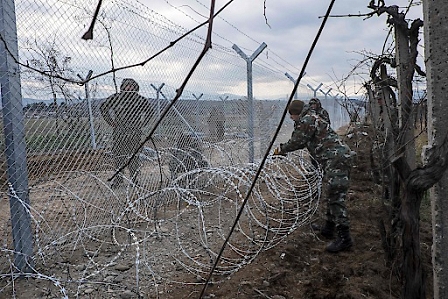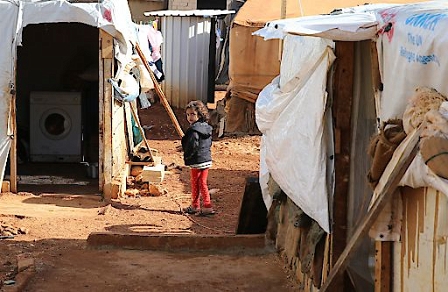Erstellt am: 16. 2. 2016 - 16:12 Uhr
Rumours, rhetoric, and restrictions
There's a lot of nonsense being talked about refugees. Some of it is in the public discourse, where the rumour machine is churning out countless stories of alleged crimes and transgressions committed by refugees. These range from the rather misleading to the downright fake, and are being well countered on Hoaxmap.
FM4 Reality Check
Hear the programme in the FM4 Player or subscribe to the podcast and get the whole programme after the show
Somewhat harder to pick your way around is the nonsense an rhetoric being heard in Europe's corridors of power. "Refugees welcome" has, in many places, turned into "not in my back yard", as each country struggles in vain to find its own solution to a problem than can only be solved by everyone working constructively together. The solutions some individual countries have come up with appear as nonsensical and fanciful as anything on Hoaxmap.

UNHCR
However, someone who can see what makes sense and what doesn't is William Spindler of the UNHCR. As the Austrian government today holds forth on "border management" on Austria's southern borders, William Spindler gave us a Reality Check on the facts and the fiction of how to handle the refugee situation fairly and effectively, starting with the often blurred line between refugees and economic migrants.
RC: About 60% of the people currently arriving in Europe are women and children. Is that unusual, compared to refugee movements to Europe before this crisis?
WS: When you see people moving for economic reasons the percentage of men tends to be higher. When you see people fleeing persecution, war, human rights violations, then you have more children and women in those flows. What we have seen in Europe last year and at the beginning of this year is a large number of men arriving at the beginning, they were the majority, whereas towards the end of last year and the beginning of this year, the proportion of children and women has increased. This is to be expected when you see refugee movements as opposed to economic migrants.

AFP / LOUISA GOULIAMAKI
RC: Austria's interior minister is talking about what she calls a "coordinated domino effect of restrictions by countries along the Balkan route." What are the consequences of this likely to be?
WS: In our view, to impose restrictions on refugee flows does not solve the problem. The reality of the world is that as long as you have conflict, and human rights violations, and persecution, people will flee and try to find safety elsewhere. So the answer is not to try to restrict these movements, but to organize them so that you have some degree of control over who is travelling. so you can give priority to those who are in most need, which is obviously not the case at the moment. So in our view, just to bring more restrictions, whether they are legal restrictions in who you allow to cross a border, or physical barriers such as walls and fences that have been going up recently in Europe, is counter productive.
It doesn't really solve the problem, it just forces people to take more dangerous, longer routes, to use smugglers to try to evade these controls, and to endanger their lives, and also to make it more difficult for the authorities to screen and interview these people to know who they are, and why they are trying to come to Europe.

AFP / Robert ATANASOVSKI
RC: One of the things that some countries talk about is the idea of sending a message to people who might try to come to a particular country that it's not an attractive country to come to as an asylum seeker. Does that approach really work?
WS: No, it doesn't, for two reasons: first of all, it wrongly assumes that people are trying to come to Europe for economic reasons or to get benefits; that's not the case. If you are escaping war and persecution, the last thing on your mind is going to be where, or how much benefit you are going to get. The second thing is that simply by trying to make yourself unattractive, you are not solving the problem, you are just making the people go to another country, which might suit you, but it doesn't really deal with the problem. In our view, what Europe needs to do is to address this issue in a coordinated way, because it's true that certain countries, and Austria among them, has received a very large proportion of asylum seekers. In the case of Austria, in terms of the size of its population, it's one of the countries in Europe that has received the most asylum seekers, and we think this is not sustainable. There has to be more participation from other countries. There needs to be solidarity within Europe. There is already a mechanism in place to relocate asylum seekers within Europe, so the responsibility for taking care of them is shared more equitably. However, this programme is not really working. So far, out of the 160,000 places that were agreed by the European Union last year, only about 400 people have actually moved. So the mechanisms are in place, but they are not being applied and they are not being used.

AFP PHOTO / JOSEPH EID
If we could bring people straight from countries such as Turkey, Jordan, Lebanon, that are at the moment overwhelmed with the number of refugees they are receiving, if we could bring them through legal, orderly, organised, safe ways, in planes, with visas, to Europe, the authorities in Europe would have time to organise a reception, they would be distributed fairly throughout Europe. Whereas at the moment what we have is people moving by their own means, and arriving where they think they are going to receive assistance, and overwhelming the local authorities of the towns where they arrive. We need to put in place a system that shares this responsibility equally, that takes into account the legitimate concerns of the countries who are receiving too many asylum seekers and refugees, also that has in place adequate security provisions, because at the moment nobody is checking who is arriving. So, instead of trying to block these movements, we should try to facilitate them, organise them, making them predictable and organised and, of course, assisting the countries where most of these refugees are, so they can stay there. If we can protect refugees in Turkey, or Jordan, or Lebanon, then they won't have to take these long, dangerous journeys to try to find safety in Europe.
FM4 Reality Check
Monday to Friday from 12.00 to 14.00, Saturday from 12.00 to 13.00, and after the show via Podcast or fm4.orf.at/realitycheck.



